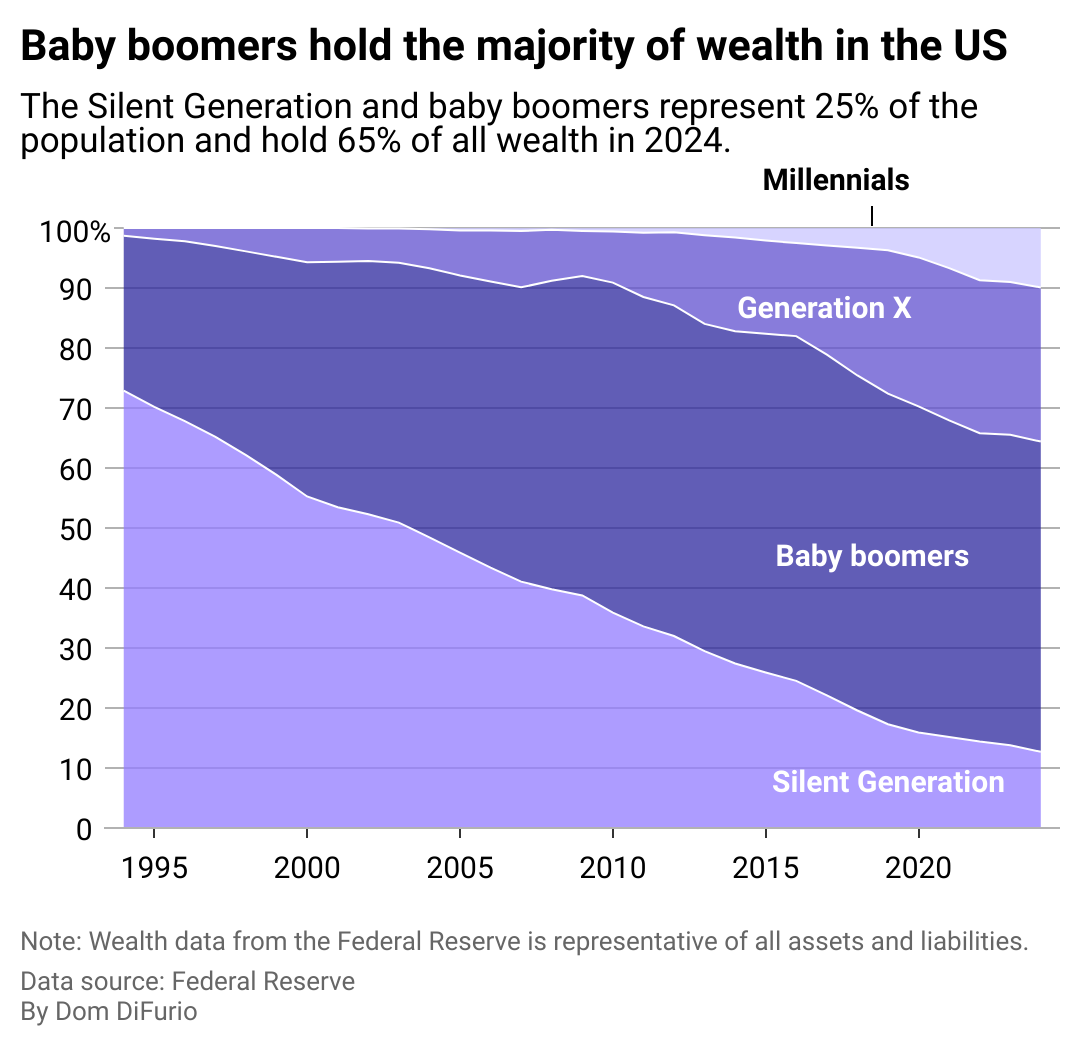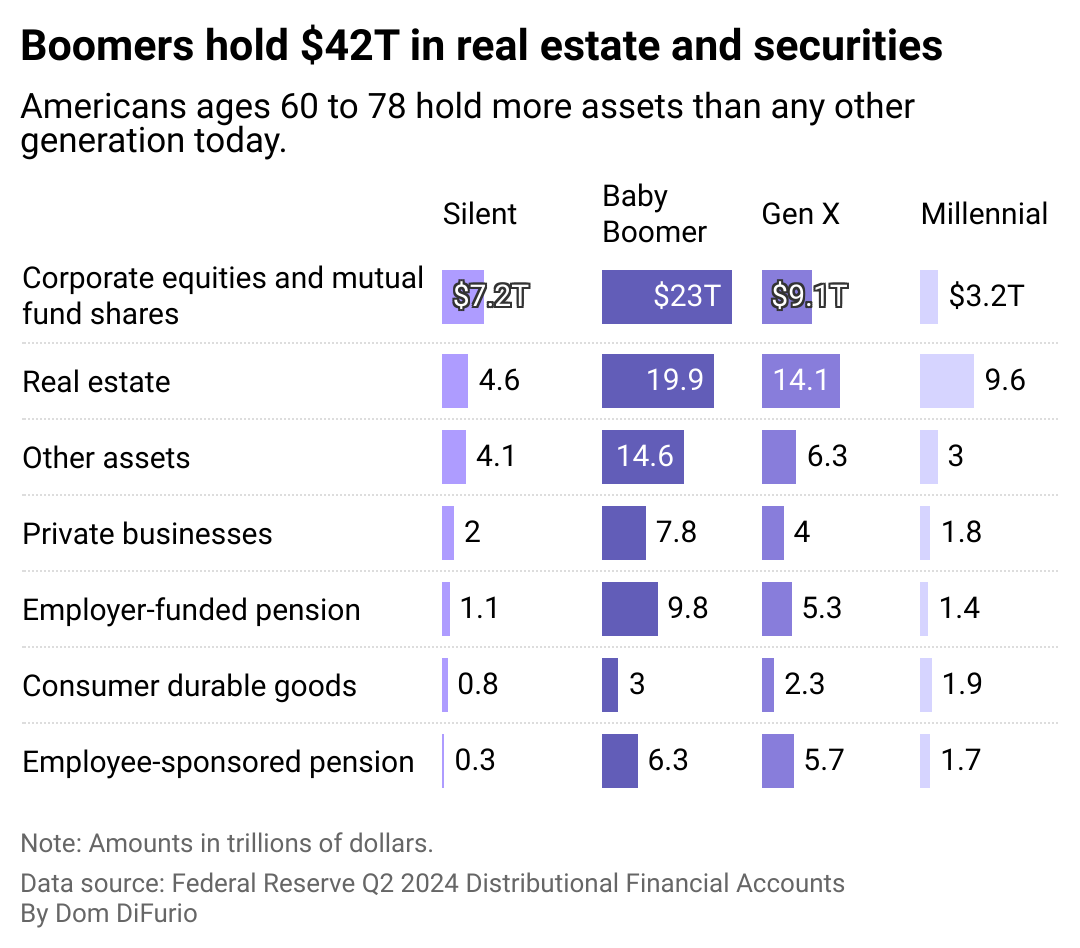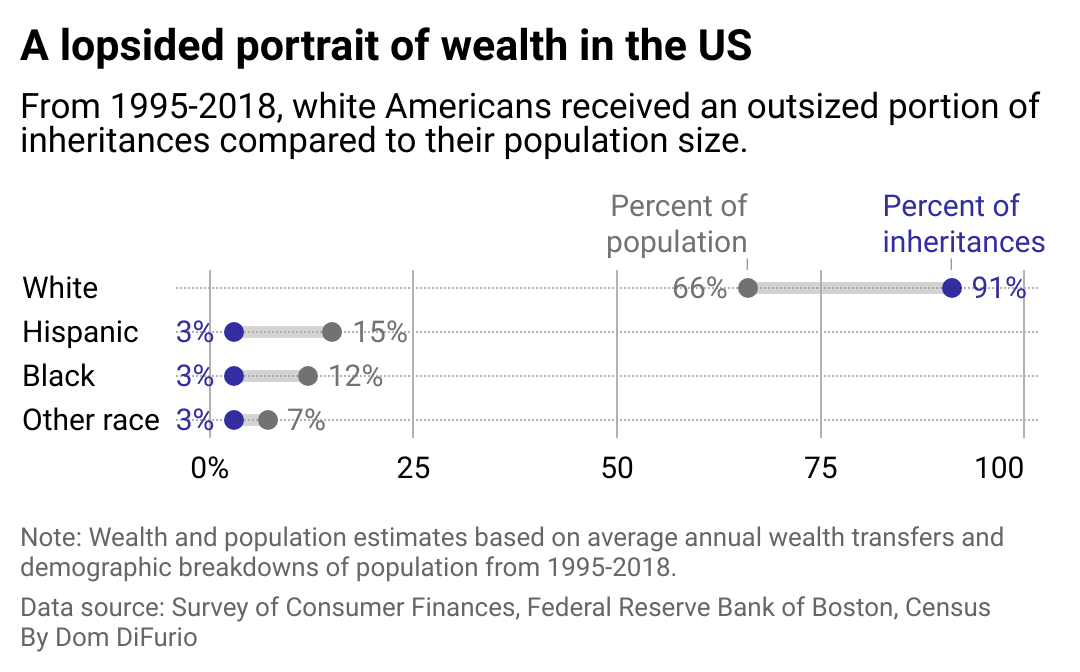
The Great Wealth Transfer in 3 charts
More than $80 trillion over 20 years—that's the scale of the coming wave of wealth expected to trickle down to younger Americans over the next two decades.
Dubbed the Great Wealth Transfer, the shift of assets from older generations to millennials and Generation Z may profoundly reshape financial influence and spending priorities in America.
By one estimate, the Silent Generation and baby boomers are set to pass on $90 trillion to younger generations by 2044. Other estimates are more conservative, anticipating $84 trillion or so will change hands. Though the exact figure varies, one thing is for certain: As more members of the Silent Generation and boomers enter their elder years and pass away, leaving assets to their heirs, wealth transfers will continue to increase.
Stacker analyzed wealth distribution and asset ownership data from the Federal Reserve, as well as studies from investment banking and real estate consulting firms, including Knight Frank, to explore who will benefit from the largest-ever generational transfer of wealth.
Generational wealth, typically passed down along family lines, may not represent a sea change in class structure but rather a shift in priorities and spending behaviors. The wealth transfer could change not only individual financial situations for millions of Americans, but also shift who wields power and influence—and how they'll exert it in markets and their communities.

As they enter retirement, boomers will pass on the most wealth accumulated over a lifetime
Over the past three decades, boomers, Generation X, and millennials have grown wealthier over their lifespans. That's as the Silent Generation's overall wealth has shrunk from 70% to just 10% during that time frame. Boomers are now the wealthiest generation, holding just over half (52%) of all wealth in 2024.
Social programs, government subsidies, and historically good timing helped boomers grow and maintain wealth over the last half a century. Boomers, born between 1946 and 1964, were born or came of age during one of the greatest economic expansionary periods in history in the decades following World War II.
This post-war generation drove the population growth that birthed modern-day suburbs, where government-subsidized homes were often cheaper to buy than rent in the 1950s. A roaring post-war economy, as well as the G.I. Bill and employer-funded pensions, now dwindling, allowed boomers to capture much wealth in their lifetimes.

Corporate equities and real estate are the largest sources of wealth
Corporate equities and real estate, the most valuable assets held across all generations based on existing data, have facilitated the accumulation of wealth for baby boomers.
Boomers' experiences with wealth creation differ in many ways from millennials, who are poised to reap the largest benefits from the Great Wealth Transfer. A study conducted by the University of Cambridge and published in the American Journal of Sociology in 2023 revealed that by age 35, millennials on average had fewer prestigious careers, such as law and medicine, and were more likely to pursue lower-earning careers like teaching and social work.
Millennials also had lower levels of homeownership, and were more likely to have a negative net worth than boomers when they reached the same age. Overall, as millennials enter middle age, they are building wealth, but it is distributed more unequally than any generation before them.
Not represented in the Federal Reserve data are the youngest generation, Gen Z. Born between 1997 and 2012, the oldest members of the cohort will hit age 28 this year; some are still in high school or just entering the workforce. According to Cerulli Associates, a financial services consulting firm, Gen Z holds about a quarter of the wealth of millennials by one estimate and will also benefit somewhat from the coming wealth transfer.
As the Silent Generation and boomers age, and their real estate holdings are passed on to relatives or sold for cash, experts anticipate that this transfer could alleviate the shortage of housing inventory plaguing the nation today. However, don't expect direct turnover between generations to be significant. Several factors, including affordability and location, indicate why houses vacated by older generations aren't necessarily a good fit for younger Americans seeking a first home. Moreover, new construction will still be necessary to meet the growing demand for housing.
The younger generations set to inherit those investments have different views of how money can best be spent, which could have implications as they come into new prosperity. For one, they aren't as sold on real estate as a high-return investment as their elders.
Shaped by an economic crisis and climate disasters, younger generations who receive an inheritance during the wealth transfer may have different spending priorities. Research has also found they care more about issues like climate change and inequality, which will have a profound impact on how their wealth is invested.

White Americans see 10 times the intergenerational wealth as other races
An Edward Jones study this year of about 2,200 Americans found that almost half of all Americans intend to leave an inheritance for their children, grandchildren, or both. However, other studies show that far fewer Americans are actually on the receiving end of inheritances.
In fact, the best available data reveals that the wealth transfer windfall won't directly benefit most Americans. Only a small portion of Americans receive an inheritance of any kind each year, and more than half of those who do receive less than $50,000. The Edward Jones poll also found that 68% of Americans believe that there has been a trend toward spending more money over longer lifespans, which will impact how much wealth transfers compared to previous generations.
Cerulli Associates estimates that 42% of wealth transferred in the coming decades will go to 1.5% of households. Historical inheritance data shows that white Americans receive 91% of inheritances each year on average, despite making up 66% of the population. That's according to data analyzed by the Boston Federal Reserve from 1995 to 2018, adjusted for population breakdowns over the same period.
Black, Hispanic, and Americans of other races and ethnicities received just 3% of inheritance dollars, representing two to four times less inheritance compared to their population size. In studying two decades of wealth transfers, researchers concluded that inheritances themselves, however, contributed only modestly to widening racial wealth gaps.
"The next generation, holding major investment power, is likely to direct significant amounts of capital to causes beyond solely [maximizing] economic growth," Modern Affluence Exchange Co-founder Ben Whattam told Knight Frank in a 2024 report.
Those causes, be they social or environmental, have the potential to shift how wealth is accumulated, shared, and passed on to the next generation—which, someday, millennials and Gen Z must do as well.
Story editing by Alizah Salario. Additional editing by Kelly Glass. Copy editing by Paris Close. Photo selection by Lacy Kerrick.



